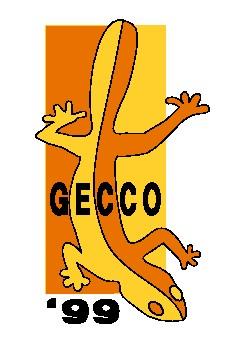
FOGP'99 Workshop on
FOUNDATIONS OF GENETIC PROGRAMMING
Bird-of-a-feather Workshop
at the
1999 Genetic and Evolutionary Computation Conference
(
GECCO-99
) 1999

Bird-of-a-feather Workshop
at the
1999 Genetic and Evolutionary Computation Conference
(
GECCO-99
) 1999
Are we at the limit of schema-based approaches? Or, how can we extend them? On what sort of questions will they be useful?
How useful is fitness landscape analysis? How can it be bolstered? Where does it have shortcomings in terms of operator analysis? Can new operators overcome these? How could we measure the tradeoff between the computational expense of learning about a problem in order to set up powerful operators versus using that computation to solve it with a generic form of an evolutionary algorithm?
What can we learn from theoretical biology? Topics might include Price's variance theorem, Fisher's fundamental theorem of selection, Wright's theories of evolution in (semi-)isolated (island, demes) populations, punctuated equilibrium and mass extinctions, gene epistastis, etc. Do modern molecular studies of evolution offer any valuable insights?
Hand-designed problems are not well linked to real-world problems. The demonstration or comparison problems (e.g. artificial ant, boolean multiplexer, parity) have the same linkage issue. How can the gap be closed?
How can experimental approaches yield general knowledge? Can we set up a formal methodology researchers can follow to elucidate their results and provide reproduction of results and solid bases for comparison?
On what dimensions could we classify (real world) problems to be approached by GP? What complexity characterizations are most useful? What prevents a useful taxonomy of GP-hardness from being derived? What are the fundamental limitations of search using GP?
Clearly the above is not intended to be an exclusive list and other new theoretical developments are also welcome.
| Jason M. Daida | ps | Reconnoiter by Candle: Identifying Assumptions in Genetic Programming | |
| W. B. Langdon | ps | html | Linear Increase in Tree Height Leads to Sub-Quadratic Bloat |
| Peter Nordin, Wolfgang Banzhaf, Frank D. Francone | ps | Compression of Effective Size in Genetic Programming | |
| Riccardo Poli | ps | Schema Theory without Expectations for GP and GAs with One-Point Crossover in the presence of Schema Creation | |
| Justinian Rosca | ps | Genetic Programming Acquires Solutions by Combining Top-Down and Bottom-Up Refinement | |
| Xin Yao | ps | Universal Approximation by Genetic Programming | |
| Byoung-Tak Zhang | ps | Bayesian Genetic Programming |